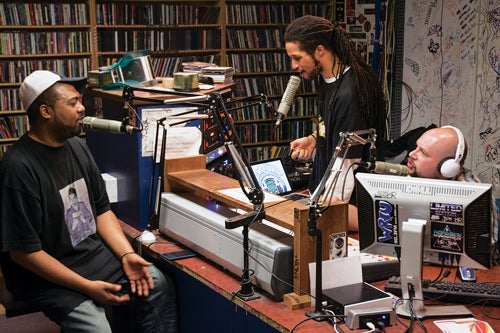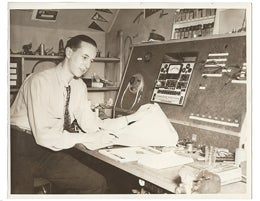Radio Free RI

Campus airtime now leases for cash (Georgia State’s WRAS, which launched R.E.M. and Radiohead, has become an NPR affiliate) and radio in general is losing ground to online streaming, but WRIU remains the independent, student-run, commercial-free voice of URI. Yet the reggae and electronica, public affairs and children’s programming on 90.3FM airs largely under the radar.
Too bad, since unlike a pre-programmed Pandora station, WRIU has the potential to expand listeners’ horizons.

It formed in ’39 as WHOE (a joke about gardening tools, of course) and now reaches most of Rhode Island and some surrounding areas. Announcers are unpaid college students and community members.
Alums credit the station with launching professionalism. “You have the duty of providing interesting programming,” says Gregg Perry ’88, who worked at WPRO and WHJJ before founding the Perry Group. “And, you have to do it on time.”
“You learn everything from organizational dynamics to teamwork and responsibility,” echoes Duffy Egan, who spent a few semesters at URI and is now Cumulus Media’s director of engineering. He remains the station’s contract engineer.
Jim Tingley ’75, a NASA computer programmer, remembers Firesign Theatre visiting: “We all crammed into a tiny booth as Phil Proctor and Peter Bergman launched into their crazy banter. I wasn’t in radio at the time, but perhaps it contributed to pursuing my short-lived, on-air career.”
Another, very personal memory comes from Joan C. Hudson ’68, M.A. ’74. Her uncle, the late Robert W. Kettlety ’51, was an electrical engineering student and WHOE staffer. “I remember my grandmother showing me his former bedroom—it was wall-to-wall radio apparatus.”
Some 15 years ago, she brought Kettlety, by then retired from a career that had spanned the space program, farming and oil industries, to visit the Student Union. For the length of a song, the announcer gave him his old seat back. “It was a precious, joyful moment,” she remembers.
“WRIU is an astounding place, diverse and significant,” says Laura Travis, Celtic Realm DJ since ’82. “What happens with more popular forms of music is that listeners realize there is something long and deep at work. Then they seek out programs like mine. It’s the original idea of public radio—local, informative, responsive.”
In the end, perhaps the most telling paean comes from senior Sara Holland ’15, FM program director. “I was a journalism major who didn’t love writing,” she says. “Then I joined the station, and I ended up loving journalism.”
After 75 years, then, the power to inspire when it counts the most.
 Home
Home Browse
Browse Close
Close Events
Events Maps
Maps Email
Email Brightspace
Brightspace eCampus
eCampus


